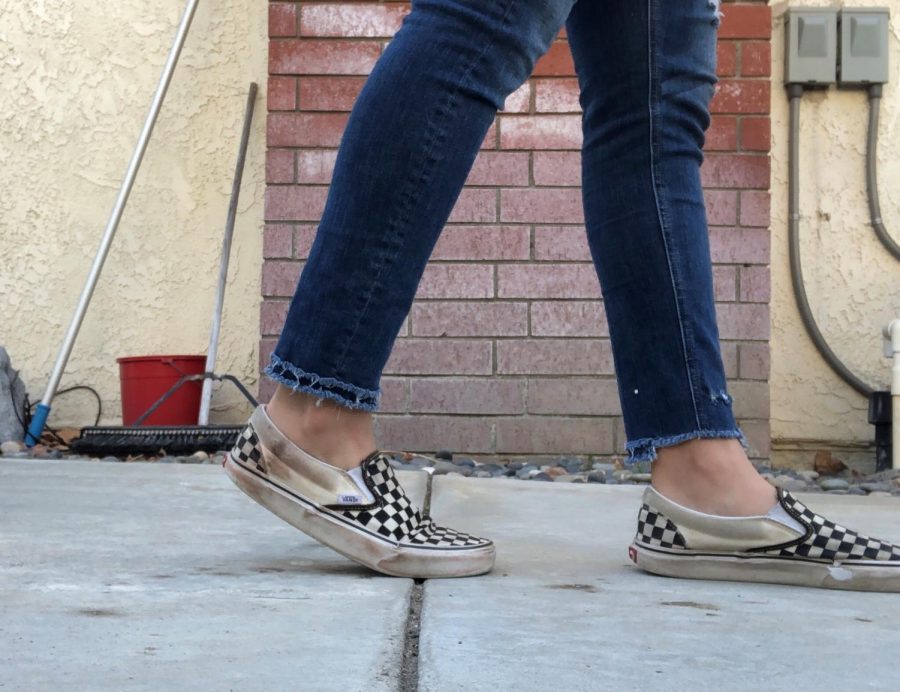The World’s Unexplained; Part 4
A common superstition amongst young kids is the warning to not step on a crack or you’ll break your mom’s back. This little rhyme has made many avoid the cracks on a sidewalk.
December 18, 2020
Back in the 1970s a famous saying of “Step on a crack and break your mom’s back” originated from a popular magazine, but over time it has become a superstition that many believe in. The idea of a superstition makes many people grow curious about what supernatural ideas are the cause of how these beliefs work. Katelyn Larsen (11) quoted, “They were fun jokes that I grew up with, but now it’s like they’re engraved into my brain.” The definition of superstition is “a belief or practice resulting from ignorance, fear of the unknown, trust in magic or chance, or a false conception of causation” (www.merriam-webster.com). Religions and family traditions have spread more beliefs into the unknown ideology of superstitions. It is still a mystery whether these ideas work or not, but people put their trust in them.
As superstitions spread around the globe, plenty of popular superstitions come to mind. Where did these beliefs originate? Religions have built up superstitions that many believe into this day as they spread widely on the internet, in stories, or popular shows. Throughout time, salt has been seen as an important need. People have believed that when they knock salt over they should toss salt over their shoulders to remove the bad luck. That superstition was actually believed to be a way to blind Satan.
The Devil has prompted many superstitions like the number 666 as the number was a code for the Roman emperor Nero because of the numerical value of his name in Hebrew. Additionally, the popular day of Friday the 13th came from a religious belief. The Christian faith deemed Fridays to be bad luck as it was the day Jesus had died. People’s fear of this day has gotten intense as a phobia was named for it called friggatriskaidekaphobia. It is unknown why the number 13 has gotten such a bad reputation though, but it is associated with the biblical story of the Last Supper as Jesus dined with his 12 disciples before being arrested and crucified. Many famous figures have shown fear of the number thirteen including Franklin D. Roosevelt who often refused to have dinner parties with 13 guests. A phobia was even started after the fear of the number 13 called triskaidekaphobia.
While many superstitions have a Christian reason behind them, there are others who helped formed many before the widespread of Christianity. On the other side of the lucky coin, the number 7 has seemed to bring good luck. It seemed to have gotten its beliefs from the seven gods of fortune from Japanese mythology or the Seven Days of Creation from the Book of Genesis. Knocking on wood to bring good luck to the future has a religious background as it was believed the good spirits lived in trees. People knocking on wood would be a call to them asking for guidance or help. On the flip side, placing a hat on a bed is considered to be bad luck as ancestors believed the bad spirits resided in the hair. Once you place the hat on your head, the bad spirits would be able to get into your mind. The influence of religion allows many famous superstitions to grow, but it’s a wonder if they really work due to their supernatural ideas.
It is no doubt that religion plays a part in forming a superstition, but history has influenced other ideas like the Celts in Ireland believing four-leaf clovers are powerful objects. Each popular superstition has its reason for origin. Animals are no stranger to being involved with these superstitions as coming across a black cat is said to be bad luck. The black cat goes back to the medieval ages as this was the time period when people accused of witchcraft as they believed witches owned black cats or could transform into them. A lucky rabbit’s foot can be traced to 600 BCE due to the belief of totemism, the belief that animals were the ancestors of humans.
People have been holding their breath while passing a cemetery as it was believed that breathing and life are connected. Ancient Egypt, Europe, and Native Americans have connected the soul to the idea of breathing so they believe the souls can’t get in you while you hold your breath. Modern ones have come up like the saying, break a leg, originating in the 1920s. Actors prefer that over saying good luck, but historians believe it to be an adaptation of a saying from the 1670s that included harsher language. The Roman Empire has popularized the idea of breaking a mirror causes 7 years of bad luck, but many cultures before the Romans believed breaking a mirror can capture a soul.
Candles on a birthday cake even have a superstition dating back to the ancient Greeks as they’d bake a circular cake with candles on it to honor the Goddess of the moon, Artemis. The candles would light up the cake so it gave an idea of the moon. Weddings hold some superstitions too as if the bride sees the groom on their wedding day, their relationship would have bad luck. It was actually believed that the bride would get cold feet. History has brought many unknown questions to society today as people wonder just how well these superstitions work.
Meanwhile at home, culture and family have caused many interesting superstitions that the whole family can believe in. Kaylee Angulo (10) states their family has taken part in many superstitions during their daily lives. They describe the superstitions they take part in is to place limes by the windows and circling the house with salt to ward off bad spirits. Kaylee said they believe in witchcraft superstitions. They said the animal are spirits trying to bring help if they encounter them multiple times. Superstitions have even taken part in Kaylee’s sports, “I have a piece of jewelry that brings me good luck and I wear it before games. If I forget to, we usually end up losing the game.”
Zach Lillemoen (11) has found a fascination with superstitions. Just like Kaylee, he talks about having a pre-game charm, “I always have to hit both posts during warmups. I also find listening to Without Me by Eminem a good luck song for my game.” Some members of the family don’t take an active part in the family traditions like
Nadine Kashou (11) tells how she isn’t a big believer in the ideology of superstitions. Nadine describes her disbelief in the unknown presence of superstitions like, “I don’t think they are real, I find it very stupid. Although, my mom has me wear an evil eye charm on my necklace in a way to ward off bad people.” Passed down from each generation, families tell each generation about the superstitions they believe in
Nowadays, people all over the world believe in superstitions and their many properties. It has been discovered that around 70% of students are said to have a lucky charm to bring them luck with academics (www.medicalnewstoday.com). People tell researchers how they find relaxation when taking part in good luck superstitions. There are people out there who don’t believe in superstitions because it’s not science.
Ned Georgy (11) doesn’t believe in any superstitions as he says, “they aren’t supported by science. There’s nothing written or proven throughout history, it’s just a belief.” While the unknown isn’t for everyone, those who believe in the unbelievable have shown better performance in activities and academics. Also when dealing with uncertainty, people place their faith in an unknown ideology. An example of that is to knock on wood. Many doubts about the unknown are present; however, some people have strong beliefs in their superstitions.
The truth on whether these superstitions work or don’t is still unknown, but to many, it is what keeps people safe. It is still unsure to the public on the secrets of the supernatural. The supernatural world is terrifying to those who dare to question what lurks in the dark, but others find its unusual properties interesting. Superstitions are no stranger to the world of the unexplained. Unknown territories are something many people don’t mess with as evil spirits roam the Earth searching for victims. Traditions have been made to prevent them from taking over, but it is a mystery if they truly work. For now, the answer remains unsolved.







































Sharon Sun • Dec 19, 2020 at 10:21 AM
Hi Sarah, this is another great “The World’s Unexplained” article! I found it interesting to learn about the origins of multiple modern superstitions and their connections to past beliefs, as well as current interviews with Yorba Linda students detailing their own superstitious traditions.
Tiana Salisbury • Dec 18, 2020 at 10:04 PM
This is a very interesting article! I have heard of many of these superstitions, but I never knew how they came to exist. Great work!
Emily Eslao • Dec 18, 2020 at 4:36 PM
These “World’s Unexplained” articles are always so interesting! It’s always fun to see how people may or may not genuinely believe these things. It was my first time learning of the origins for many of the superstitions listed here; I hope to learn more if there’s a part 5